(完整版)英语七年级下册仁爱版期中复习资料
- 格式:doc
- 大小:18.32 KB
- 文档页数:5
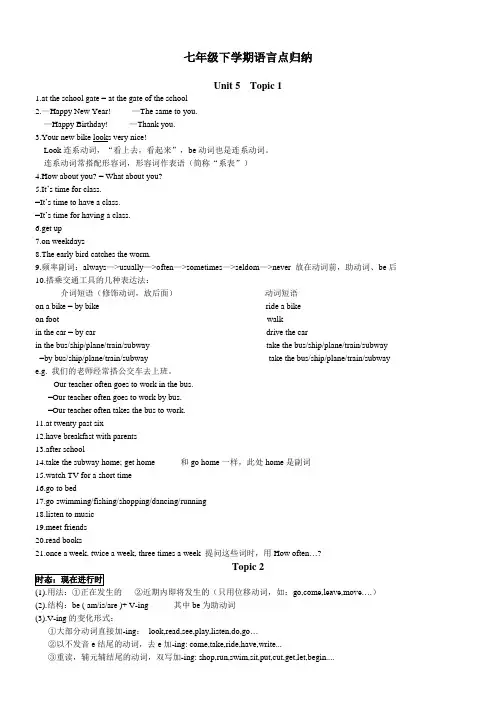
七年级下学期语言点归纳Unit 5 Topic 11.at the school gate = at the gate of the school2.—Happy New Year! —The same to you.—Happy Birthday! —Thank you.3.Your new bike looks very nice!Look连系动词,“看上去,看起来”,be动词也是连系动词。
连系动词常搭配形容词,形容词作表语(简称“系表”)4.How about you? = What about you?5.It’s time for class.=It’s time to have a class.=It’s time for having a class.6.get up7.on weekdays8.The early bird catches the worm.9.频率副词:always—>usually—>often—>sometimes—>seldom—>never 放在动词前,助动词、be后10.搭乘交通工具的几种表达法:介词短语(修饰动词,放后面)动词短语on a bike = by bike ride a bikeon foot walkin the car = by car drive the carin the bus/ship/plane/train/subway take the bus/ship/plane/train/subway =by bus/ship/plane/train/subway take the bus/ship/plane/train/subway e.g. 我们的老师经常搭公交车去上班。
Our teacher often goes to work in the bus.=Our teacher often goes to work by bus.=Our teacher often takes the bus to work.11.at twenty past six12.have breakfast with parents13.after school14.take the subway home; get home 和go home一样,此处home是副词15.watch TV for a short time16.go to bed17.go swimming/fishing/shopping/dancing/running18.listen to music19.meet friends20.read books21.once a week, twice a week, three times a week 提问这些词时,用How often…?Topic 2(1).用法:①正在发生的②近期内即将发生的(只用位移动词,如:go,come,leave,move….)(2).结构:be ( am/is/are )+ V-ing 其中be为助动词(3).V-ing的变化形式:①大部分动词直接加-ing:look,read,see,play,listen,do,go…②以不发音e结尾的动词,去e加-ing: come,take,ride,have,write...③重读,辅元辅结尾的动词,双写加-ing: shop,run,swim,sit,put,cut,get,let,begin....(4).时间搭配词:①now②具体几点钟:at 9:30③Look! Listen!④看图写话⑤前、后句出现祈使句:Turn off the TV. Your father is sleeping.⑥询问某人在何处,回答时用现在进行时,如:—Where is Lucy?—She is reading a book in her room.1.make cards play cards2.on the telephone/TV/computer3.do some cleaning/shopping/cleaning4.Excuse me, may I borrow some English workbooks?5.look for6.on the shelves7.How long can I keep them?8.return …. on time9.Thank you all the same.10.run around the playground11.have a soccer game12.over there13.clean the blackboard14.at the back of the classroom15.talk to sb.talk with sb.16.want to visit ... one dayTopic 31.—What day is it today?—It’s Sunday/Monday/Tuesday/Wednesday/Thursday/Friday/Saturday.2.have a music/history/geography/Chines/math/politics/biology/computer science class have an English/art class3.—What time is the class over?—(It’s over) at twenty to eleven.=> The school/class is over. after school after class 4.—What time does the class begin?—(It begins) at ten fifty.5.How many English lessons does he have every week?How many +可数名词复数形式......? “多少……?”How much + 不可数名词......? “多少……?”How much......? “多少钱……?”6.on Thursday morning/afternoon/eveningon Sunday/Monday/Tuesday/Wednesday/Thursday/Friday/Saturdayin the morning/afternoon/evening7.I think you must like English very much.=> I think (that) + 宾语从句8.What do you think of it ? => think of= How do you like it ?9.help each other10.Let’s go.=> let/make + 宾语+ 动词原形11.learn about the past12.talk about a map of China13.work on computers “在电脑上工作”14.work on math problems “算数学题”15.—Which subject do you like best ? = —Which subject is your favorite ?—I like history best. = —History is my favorite.16.Swimming is his favorite outdoor activity.=>动名词(V-ing)作主语,谓语动词要用单数!e.g. Reading books _________ (be) good for us.Helping others __________ (make) me happy.17.have four classes in the morning18.some other subjects19.draw pictures with my friends in the park20.Can you tell me something about it ?=> tell sb. something about sth./sb.翻译:“语文课上刘老师正在告诉我们一些关于雷锋的事。

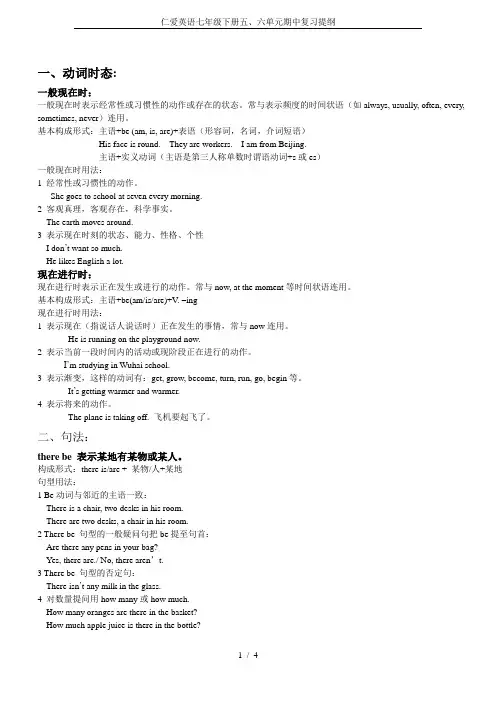
一、动词时态:一般现在时:一般现在时表示经常性或习惯性的动作或存在的状态。
常与表示频度的时间状语(如always, usually, often, every, sometimes, never)连用。
基本构成形式:主语+be (am, is, are)+表语(形容词,名词,介词短语)His face is round. They are workers. I am from Beijing.主语+实义动词(主语是第三人称单数时谓语动词+s或es)一般现在时用法:1 经常性或习惯性的动作。
She goes to school at seven every morning.2 客观真理,客观存在,科学事实。
The earth moves around.3 表示现在时刻的状态、能力、性格、个性I don’t want so much.He likes English a lot.现在进行时:现在进行时表示正在发生或进行的动作。
常与now, at the moment等时间状语连用。
基本构成形式:主语+be(am/is/are)+V. –ing现在进行时用法:1 表示现在(指说话人说话时)正在发生的事情,常与now连用。
He is running on the playground now.2 表示当前一段时间内的活动或现阶段正在进行的动作。
I’m studying in Wuhai school.3 表示渐变,这样的动词有:get, grow, become, turn, run, go, begin等。
It’s getting warmer and warmer.4 表示将来的动作。
The plane is taking off. 飞机要起飞了。
二、句法:there be 表示某地有某物或某人。
构成形式:there is/are + 某物/人+某地句型用法:1 Be动词与邻近的主语一致:There is a chair, two desks in his room.There are two desks, a chair in his room.2 There be 句型的一般疑问句把be提至句首:Are there any pens in your bag?Yes, there are./ No, there aren’t.3 There be 句型的否定句:There isn’t any milk in the glass.4 对数量提问用how many或how much.How many oranges are there in the basket?How much apple juice is there in the bottle?祈使句用法祈使句表示请求、命令、建议等,句子通常不带主语,谓语动词用原形,朗读用降调。
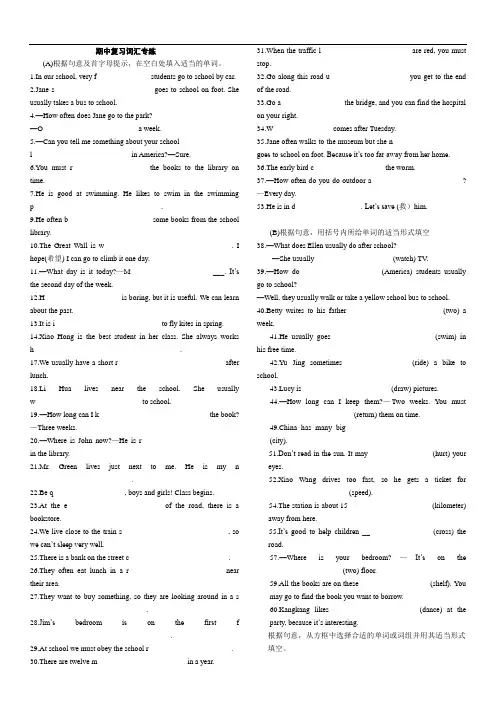
期中复习词汇专练(A)根据句意及首字母提示,在空白处填入适当的单词。
1.In our school, very f______________ students go to school by car.2.Jane s__________________________ goes to school on foot. She usually takes a bus to school.4.—How often does Jane go to the park?—O_________________________ a week.5.—Can you tell me something about your schooll__________________________ in America?—Sure.6.You must r_____ the books to the library on time.7.He is good at swimming. He likes to swim in the swimming p__________________________________.9.He often b______________________ some books from the school library.10.The Great Wall is w__________________________________. I hope(希望) I can go to climb it one day.11.—What day is it today?—M_________________________. It’s the second day of the week.12.H____________________ is boring, but it is useful. We can learn about the past.13.It is i____________________________ to fly kites in spring.14.Xiao Hong is the best student in her class. She always works h_______________________________________.17.We usually have a short r____________________________ after lunch.18.Li Hua lives near the school. She usually w____________________________ to school.19.—How long can I k_____________________________ the book?—Three weeks.20.—Where is John now?—He is r__________________________ in the library.21.Mr. Green lives just next to me. He is my n ___________________________.22.Be q __________________ , boys and girls! Class begins.23.At the e ________________________ of the road, there is a bookstore.24.We live close to the train s ___________________________ , so we can’t sleep very well.25.There is a bank on the street c __________________________.26.They often eat lunch in a r ________________________ near their area.27.They want to buy something, so they are looking around in a s _______________________________.28.Jim’s bedroom is on the first f _____________________________________ .29.At school we must obey the school r _____________________ .30.There are twelve m _______________________ in a year. 31.When the traffic l _______________________ are red, you must stop.32.Go along this road u ____________________ you get to the end of the road.33.Go a ________________ the bridge, and you can find the hospital on your right.34.W _______________ comes after Tuesday.35.Jane often walks to the museum but she n ___________________ goes to school on foot. Because it’s too far away from her home.36.The early bird c __________________ the worm.37.—How often do you do outdoor a _______________________ ?—Every day.53.He is in d_________________ . Let’s save (救)him.(B)根据句意,用括号内所给单词的适当形式填空38.—What does Ellen usually do after school?—She usually ____________________ (watch) TV. 39.—How do ____________________ (America) students usually go to school?—Well, they usually walk or take a yellow school bus to school. 40.Betty writes to his father ________________________ (two) a week.41.He usually goes __________________________ (swim) in his free time.42.Y u Jing sometimes ________________ (ride) a bike to school.43.Lucy is _______________________ (draw) pictures.44.—How long can I keep them?—Two weeks. You must______________________ (return) them on time.49.China has many big _______________________________(city).51.Don’t read in the sun. It may ________________ (hurt) youreyes.52.Xiao Wang drives too fast, so he gets a ticket for_____________________ (speed).54.The station is about 15______________________ (kilometer)away from here.55.It’s good to help children __________________ (cross) theroad.57.—Where is your bedroom?—It’s on the___________________ (two) floor.59.All the books are on these __________________ (shelf). Youmay go to find the book you want to borrow.60.Kangkang likes _______________________(dance) at theparty, because it’s interesting.根据句意,从方框中选择合适的单词或词组并用其适当形式填空。
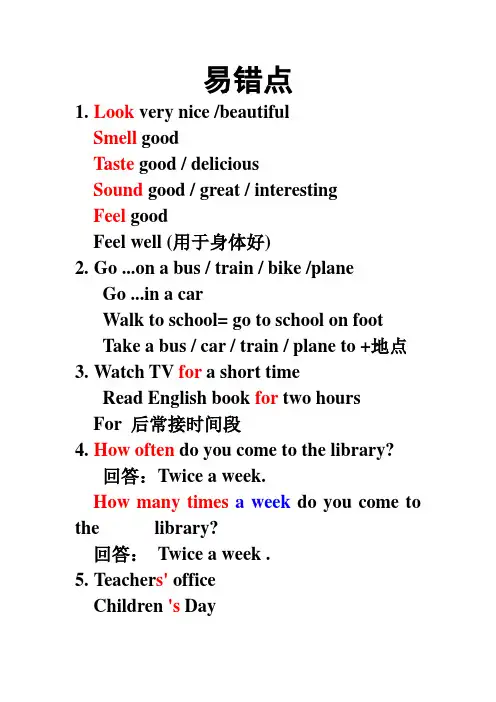
易错点1.Look very nice /beautifulSmell goodTaste good / deliciousSound good / great / interestingFeel goodFeel well (用于身体好)2.Go ...on a bus / train / bike /planeGo ...in a carWalk to school= go to school on footTake a bus / car / train / plane to +地点3.Watch TV for a short timeRead English book for two hoursFor 后常接时间段4.How often do you come to the library?回答:Twice a week.How many times a week do you come to the library?回答:Twice a week .5.Teacher s' officeChildren 's Day6.Learn sth from sb7.Thank you for your help/Thank you for doing sth8.Excuse me, do you have any English newspapers?回答:Sorry, we don't have _______.9.What day is it today?回答:It's Thursday.What's the date today ?回答:It's on April the 24th.10.What time does the next class begin?At ten thirty .11.Go upstairs /downstairs12.Don't be late (for class / work)13.Don't smoke / park.14.In the picture /newspaperOn the picture/newspaper15.首字母填词题,①要看前后句的意思。
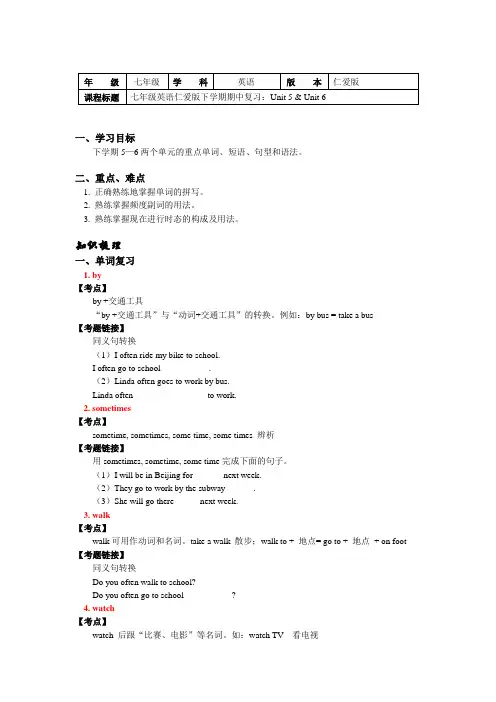
一、学习目标下学期5—6两个单元的重点单词、短语、句型和语法。
二、重点、难点1. 正确熟练地掌握单词的拼写。
2. 熟练掌握频度副词的用法。
3. 熟练掌握现在进行时态的构成及用法。
知识梳理一、单词复习1. by【考点】by +交通工具“by +交通工具”与“动词+交通工具”的转换。
例如:by bus = take a bus【考题链接】同义句转换(1)I often ride my bike to school.I often go to school _____ _____.(2)Linda often goes to work by bus.Linda often _____ _____ _____ to work.2. sometimes【考点】sometime, sometimes, some time, some times 辨析【考题链接】用sometimes, sometime, some time完成下面的句子。
(1)I will be in Beijing for ______ next week.(2)They go to work by the subway ______.(3)She will go there _____ next week.3. walk【考点】walk可用作动词和名词。
take a walk 散步;walk to + 地点= go to + 地点+ on foot 【考题链接】同义句转换Do you often walk to school?Do you often go to school _____ _____?4. watch【考点】watch 后跟“比赛、电影”等名词。
如:watch TV 看电视【考题链接】根据汉语提示完成句子。
(1)你经常看电视吗?Do you often _____ _____?(2)我们去看电影吧。
Let’s go and ____ ____ ____.5. listen【考点】listen 作不及物动词,listen to 听……(讲话);听从【考题链接】根据汉语提示完成句子。
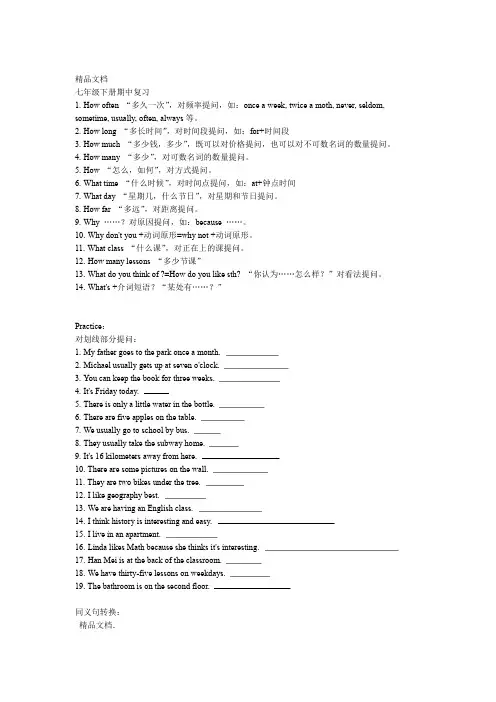
精品文档七年级下册期中复习1.How often “多久一次”,对频率提问,如:once a week, twice a moth, never, seldom, sometime, usually, often, always等。
2.How long “多长时间”,对时间段提问,如:for+时间段3.How much “多少钱,多少”,既可以对价格提问,也可以对不可数名词的数量提问。
4.How many “多少”,对可数名词的数量提问。
5.How “怎么,如何”,对方式提问。
6.What time “什么时候”,对时间点提问,如:at+钟点时间7.What day “星期几,什么节日”,对星期和节日提问。
8.How far “多远”,对距离提问。
9.Why ……?对原因提问,如:because ……。
10.Why don't you +动词原形=why not +动词原形。
11.What class “什么课”,对正在上的课提问。
12.How many lessons “多少节课”13.What do you think of ?=How do you like sth? “你认为……怎么样?”对看法提问。
14.What's +介词短语?“某处有……?”Practice:对划线部分提问:1.My father goes to the park once a month.2.Michael usually gets up at seven o'clock.3.You can keep the book for three weeks.4.It's Friday today.5.There is only a little water in the bottle.6.There are five apples on the table.7.We usually go to school by bus.8.They usually take the subway home.9.It's 16 kilometers away from here.10.There are some pictures on the wall.11.They are two bikes under the tree.12.I like geography best.13.We are having an English class.14.I think history is interesting and easy.15.I live in an apartment.16.Linda likes Math because she thinks it's interesting.17.Han Mei is at the back of the classroom.18.We have thirty-five lessons on weekdays.19.The bathroom is on the second floor.同义句转换:精品文档.精品文档a.It's time for sth=It's time to do sth. “是该做某事的时候了”b.There be +某物/某人+doing+地点。
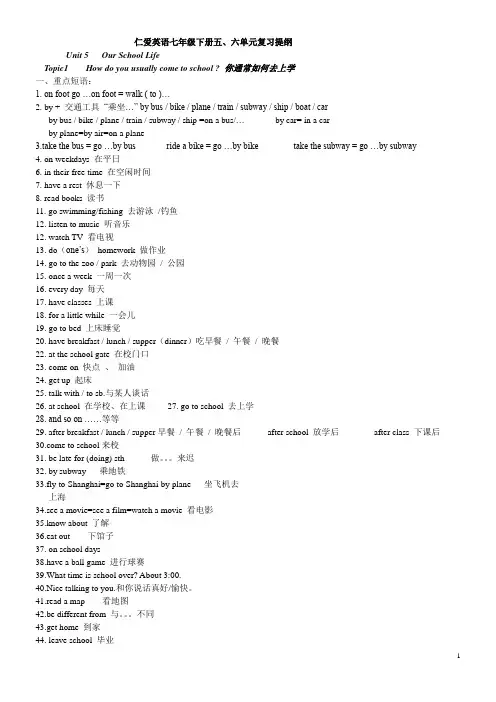
仁爱英语七年级下册五、六单元复习提纲Unit 5 Our School LifeTopic1 How do you usually come to school ? 你通常如何去上学一、重点短语:1. on foot go …on foot = walk ( to )…2. by + 交通工具“乘坐…” by bus / bike / plane / train / subway / ship / boat / carby bus / bike / plane / train / subway / ship =on a bus/…by car= in a carby plane=by air=on a plane3.take the bus = go …by bus ride a bike = go …by bike take the subway = go …by subway4. on weekdays 在平日6. in their free time 在空闲时间7. have a rest 休息一下8. read books 读书11. go swimming/fishing 去游泳/钓鱼12. listen to music 听音乐12. watch TV 看电视13. do(one’s)homework 做作业14. go to the zoo / park 去动物园/ 公园15. once a week 一周一次16. every day 每天17. have classes 上课18. for a little while 一会儿19. go to bed 上床睡觉20. have breakfast / lunch / supper(dinner)吃早餐/ 午餐/ 晚餐22. at the school gate 在校门口23. come on 快点、加油24. get up 起床25. talk with / to sb.与某人谈话26. at school 在学校、在上课27. go to school 去上学28. and so on ……等等29. after breakfast / lunch / supper早餐/ 午餐/ 晚餐后after school 放学后after class 下课后e to school来校31. be late for (doing) sth 做。
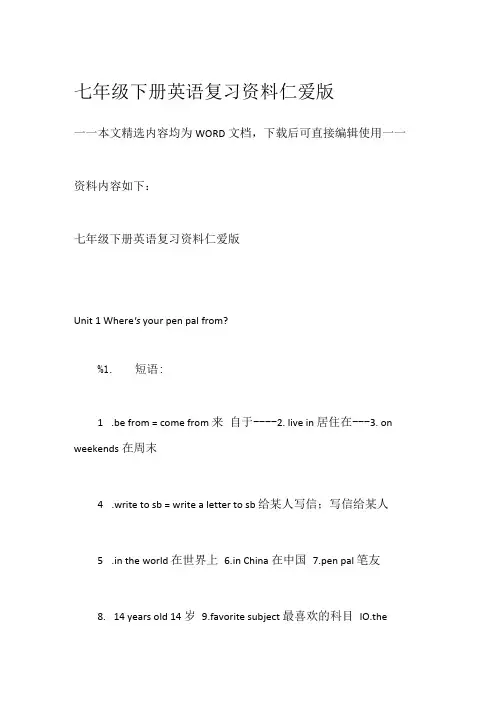
七年级下册英语复习资料仁爱版一一本文精选内容均为WORD文档,下载后可直接编辑使用一一资料内容如下:七年级下册英语复习资料仁爱版Unit 1 Where's your pen pal from?%1.短语:1.be from = come from 来自于----2. live in 居住在---3. on weekends在周末4.write to sb = write a letter to sb 给某人写信;写信给某人5.in the world 在世界上6.in China 在中国7.pen pal 笔友8.14 years old 14 岁9.favorite subject 最喜欢的科目lO.theUnited States 美国the United Kingdom 英国New York 纽11.speak English 讲英语like and dislike 爱憎9.go to the movies 去看电影play sports 做运动%1.重点句式:1Where's your pen pal from? = Where does your pen pal from/2Where does he live? 3 What language(s) does he speak? 4 I want a pen pal in China.5 I can speak English and a little French.6 Please write and tell me about yourself.7 Can you write to me soon? 8 I like going to the movies with my friends and playing sports.%1.本单元的国家,人民、语言对应。
1 Canada---- Canadian---- English / French2 France -------------------------- French ----- F rench3Japan ------ Japanese----Japanese 4 Australia----Australian ------------- English5 the United States ------------- American---- English6 the United Kingdom---British ----- EnghishUnit 2 Where's the post office?—.Asking ways:(问路)1.Where is (the nearest). ?(最近的)......在哪里?2.Can you tell me the way to ....... ?你能告诉我去......的路吗?3.How can I get to ......? 我怎样到达... 呢?4.Is there .....near here / in the neighborhood? 附近有..... 吗?5.Which is the way to ...... ? 哪条是去......的路?%1.Showing the ways:(指路)1.Go straight down / along this street. 沿着这条佳亍一直走。
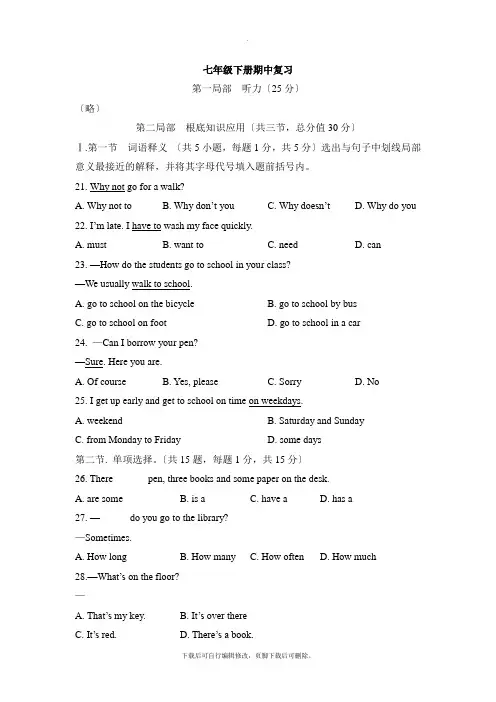
七年级下册期中复习第一局部听力〔25分〕〔略〕第二局部根底知识应用〔共三节,总分值30分〕Ⅰ.第一节词语释义〔共5小题,每题1分,共5分〕选出与句子中划线局部意义最接近的解释,并将其字母代号填入题前括号内。
21. Why not go for a walk?A. Why not toB. Why don’t youC. Why doesn’tD. Why do you22. I’m late. I have to wash my face quickly.A. mustB. want toC. needD. can23. —How do the students go to school in your class?—We usually walk to school.A. go to school on the bicycleB. go to school by busC. go to school on footD. go to school in a car24. —Can I borrow your pen?—Sure. Here you are.A. Of courseB. Yes, pleaseC. SorryD. No25. I get up early and get to school on time on weekdays.A. weekendB. Saturday and SundayC. from Monday to FridayD. some days第二节. 单项选择。
〔共15题,每题1分,共15分〕26. There ______ pen, three books and some paper on the desk.A. are someB. is aC. have aD. has a27. —______do you go to the library?—Sometimes.A. How longB. How manyC. How oftenD. How much28.—What’s on the floor?—______A. That’s my key.B. It’s over thereC. It’s red.D. There’s a book.29. —I don’t like the game _________ it’s so boring.—OK. I see.A. butB. soC. becauseD. why30. — What day is it today?—________A. It’s Monday.B. Once a weekC. It’s ten to eight.D. Two days31. —What’s ______ the building?—It’s a car.A. on front ofB. on the front ofC. in front ofD. in the front of32. I’m ________ my student card. But I can’t ________ it.A. looking for; findB. finding; look forC. looking for; findingD. look for; find33. —______ does your mother usually go to the office?—By bus.A. WhereB. WhatC. HowD. When34.—Hi, Lily. Happy New Year!—A. Thank you.B. Thank you all the same.C. I’m OK.D. The same to you.35. —May I use your bike?—A. Of course not.B. Of course. Here you are.C. I don’t have a bike.D. No, thanks.36. It’s good _____ old people to cross the road.A. helpB. helpsC. to helpD. helping37. —______ do you _________ English?—I like it very much.A. How; think ofB. What; likeC. How; like toD. What; think of38.—How long can I _______ the English workbook?—For two weeks.A. borrowB. to borrowC. keepD. to keep39. The teacher often says, “late for school.〞A. Don’tB. Don’t beC. NotD. Doesn’t40.——Go up this road to the end.A. Where are we now?B. What are we doing at the supermarket?C. How can I get to the supermarket?D. Who can get to the supermarket?第三节. 完形填空。
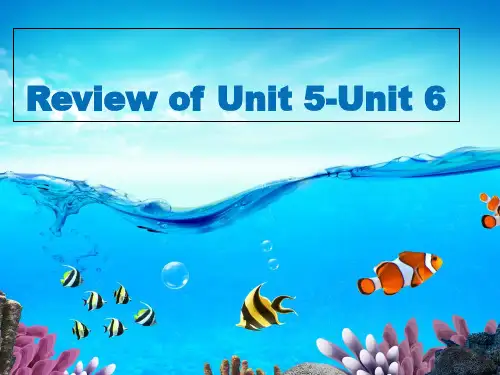
仁爱版英语七年级下册知识点复习归纳(完整版)Ren'ai English n Grade 7 Unit 5 Topic 1 ReviewKey Grammar: Present Simple Tense (often used with frequency adverbs such as never。
seldom。
sometimes。
often。
usually。
always)Key XXX:How do you usually come to school?I usually come to school by subway.How often do you go to the library?XXX/Three times a week/Very often/Every day/SeldomXXX:1.I always come to school by bus。
"by" + means of XXX。
No article is used in een。
If there is an article before the means of XXX。
such as "a"。
"the"。
"my"。
etc。
"in" or "on" should beused instead。
For example。
"on the train" = "by train"。
"on his bike" = "by bike"。
"in my car" = "by car"。
Distinguishing "on foot" and "walk": "on foot" means "walking" and is a nal phrase that cannot be used as a predicate。
仁爱七年级英语期中知识点一、单词拼写单词拼写是英语考试中非常重要的一部分,因为它涉及到了英语的基础。
以下是七年级英语中重要的单词拼写知识点:1. 日常用语,如hello、goodbye、thank you。
2. 数字及日期,如one、two、three、four、five、six、seven、eight、nine、ten、eleven、twelve、thirteen、fourteen、fifteen、sixteen、seventeen、eighteen、nineteen、twenty、thirty。
3. 食物和饮料,如bread、butter、cheese、egg、milk、meat、coffee、tea、water、juice。
4. 学校及教育用语,如class、teacher、student、book、desk、pen、pencil、school、lesson、homework。
5. 人物及身体部位,如girl、boy、man、woman、baby、head、foot、hand、face、eye、ear、nose、mouth、shoulder、leg、arm。
6. 家庭及关系,如father、mother、sister、brother、grandfather、grandmother、family、friend、uncle、aunt。
二、常用动词动词使用频率非常高,因此七年级英语课程中常常要求学生掌握一些重要的动词知识点。
以下是几个常用动词及其变形形式:1. To be动词:am、is、are、was、were。
2. To have动词:have、has、had。
3. To do动词:do、does、did。
4. To go动词:go、goes、went、gone。
5. To see动词:see、sees、saw、seen。
三、语法语法涉及到句子的构成,从而影响到了文章的表达。
以下是七年级英语中的一些常见语法知识点:1. 主谓一致:主语与谓语的数量形式要保持一致。
仁爱版)英语七年级下册各单元知识点归纳Unit5Topic1重点语法一般现在时(常与频度副词never,seldom,sometimes,often,usually,always等连用)重点句型—How do you usually come to school?—I usually come to school by subway.—How often do you go to the library?—Once/Twice/Three times a week/Very often/Every day/Sedom重点详解1.I always come to school by bus.by+交通工具名称,表示使用某种交通方式,中间不加限定词,如果交通工具前有a,the,my等限定词,就不能用by,而是用in或是on.on the train=by train on his bike=by bike in my car=by car.巧辩异同on foot与walk on foot“走路”,是介词短语,不能作谓语,只作方式状语,位于句末。
walk“走路”,是动词,可以作谓语。
go to…on foot=walk to I often go to school on foot.=I often walk to school.同样,go to….by bike=ride a bike to go to….by car=drive a car to go to…by plane=fly to go to…by bus=take a bus e on!It’s time for e on“快点,加油,来吧”。
It’s time for sth.“该做某事了”,与It’s time to do sth.意思一样。
3.look的短语look the same看起来一样look like看起来像……look for寻找look after照顾4.do my homework at school在学校做作业do one’s homework做家庭作业(注意:one’s要随主语的变化而变化,常用形容词性物主代词my,your,their,our,his,her 等)。
5we want to......know about.........the school life of American students.我们想了解一下美国学生的学校生活。
know about“了解,知道关于…”。
6巧辩异同a few与few a few“一些”,few“很少,几乎没有”,修饰可数名词。
a little与little a little“一些”,little“很少,几乎没有”,修饰不可数名词。
7They often play basketball or soccer,go swimming..........and so on........go swi mming去游泳and so on“等等”,表示还有很多。
拓展go+v.-ing表示去做某事,类似的有:go fishing去钓鱼go shopping去买东西go boating去划船go skating去滑冰8How often do you go to the library?你多久去一次图书馆?how often“多久一次”,问频率。
答语常用频度副词never,always,often等或单位时间内的次数once a week一周一次twice a month每月两次three times a year每年三次2语法讲解一般现在时一般现在时表示:(1)现在所处的状态。
Jane is at school.(2)经常或习惯性的动作。
I often go to school by bus.(3)主语具备的性格和能力。
He likes playing football.(4)客观真理。
The earth goes round the sun.常用的时间状语:often,always,usually,sometimes,every day等等。
行为动词的一般现在时,助动词是do/don’t和does/doesn’t.当主语是第一、二人称和所有复数形式时,行为动词用原形。
肯定式:I go to school on foot.否定式:I don’t go to school on foot.疑问式:Do you go to school on foot?—Yes,I do.—No,I don’t.当主语是第三人称单数时,动词用第三人称单数形式,在词尾加-s或-es。
肯定式:He goes to work by bus.否定式:He doesn’t go to work by bus.疑问式:Does he go to work by bus?—Yes,he does.—No,he doesn’t.Topic2重点语法现在进行时态。
重点句型What are you doing?He is cleaning the dormitory.Are you doing your homework?Yes,I am./No,I am not.How long can I keep them?Two weeks.重点详解1at the moment“此刻,现在”,相当于now.2巧辩异同go to sleep与go to bed①go to bed“上床”“就寝”I often go to bed at ten.②go to sleep“入睡”“睡着”Last night I went to sleep at two o’clock.3巧辩异同some,a few与a little“一些,有些”三者都修饰名词。
some既可以修饰可数名词又可以修饰不可数名词。
We want some apples and some water.a few用在可数名词复数之前,a little用在不可数名词之前。
There are a few books and a little waterin the classroom.4与how相关的短语how often多常how many多少how much多少钱how old多大5And you must return them on time.你必须按时归还它们。
Return意为“归还,回归”①return sth.to sb.把某物归还某人=give back sth.to sb.②return to“回到…”,相当于come back to…6Maria and a girl are talking at the lost and found.talk“交谈”,常用的短语talk to/with sb.“与某人交谈”巧辩异同talk,say,speak与tell(1)talk“交谈”,表示通过谈话方式交换意见、消息等。
(2)speak“说话”,强调开口发声,后常接某种语言。
(3)say“说”,强调所说的话的内容。
(4)tell“告诉”,有时兼含“嘱咐”“命令”等。
tell a truth 说真话,tell a lie说谎,tell a story讲故事等固定搭配。
7.I can’t find....my purse and I am looking for..........it.look for“寻找”,强调寻找的过程;find“找到”强调找的结果。
8.look(at),see与read look(at)指看的动作,see指看的结果,read常指看书、看报纸等。
9.Here are some photos of his.这有他的一些照片。
photos of his是双重所有格。
his是名词性物主代词,后还可以接名词所有格。
a friend of mine我的一个朋友a classmate of my brother’s我弟弟的一个同学10.I also want to go there one day.我也希望有一天到那儿。
also意为“也”,常用于be动词和情态动词后面,实义动词的前面。
巧辩异同also与too also放在句中,too用于句末。
语法讲解现在进行时1.现在进行时表示:现在正在进行或发生的动作。
2.常用的时间状语:now,at the moment,look,listen等。
3.谓语动词构成:be(am/is/are)+v.-ing 形式。
4.现在进行时态的肯定、否定和疑问式。
(1)肯定式:I am running.You are running.He/She is running.(2)否定式:I’m not running.You aren’t running.He/She isn’t running.(3)一般疑问句及回答:—Are you running?—Yes,I am./—No,I am not.—Is he/she running?—Yes,he/she is./—No.he/she isn’t.Topic3重点语法一般现在时和现在进行时的使用和异同。
重点句型What day is ti today?It’s Wednesday.Why do you like it?it’s easy and interesting.What class are they having?They are having a music class.重点详解1询问星期几用What day…?回答:It’s Wednesday/Sunday…。
与特殊疑问句词what有关的短语:what class什么班what color什么颜色what time几点what date几号(日期)2How many lessons does he have every weekday?How many+可数名词的复数形式;How much+不可数名词。
3一个星期的第一天是Sunday,在星期几前用介词on,在具体点钟前用at.4learning about.............the past了解过去learn about了解拓展learn from向……学习learn by oneself自学5What do you think of…?=How do you like…?你认为……怎么样?6—Why?—Because it’s interesting.用why提问必须用because回答。
第页47Which subject do you like best?你最喜欢什么科目?like best最喜欢,可用favorite“特别喜爱的”转换。